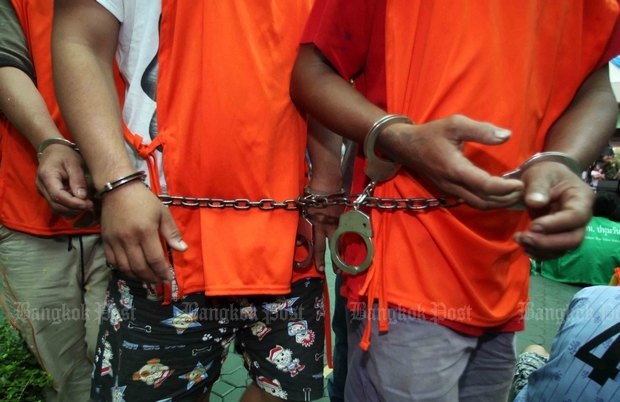
Prime Minister Prayut Chan-o-cha has banned the parading of suspects at police news briefings, saying the practice could violate human rights.
The order was made after Gen Prayut reviewed a report on human rights violations between July 23 and 29, compiled by the Rights and Liberties Protection Department of the Justice Ministry, said Tawatchai Thaikyo, the ministry's deputy permanent secretary.
Gen Prayut said that police news briefings "should focus on the progress of the investigation and the suspect should not be brought along to the event", said Mr Tawatchai.
The Justice Ministry was asked to convey the new policy to Gen Prawit Wongsuwon, the deputy premier in charge of security, and to the national police chief, Pol Gen Chakthip Chaijinda.
Elaborate photo opportunities staged by police officers have been standard practice and a staple of local news media coverage for decades. Many feature not only the suspects and the senior officers responsible for their arrest, but also seized weapons, cash and drugs. The latter are often displayed artfully, in some cases with "ya ba" spelled out using hundreds of pills.
The premier reasoned that violations of human rights could result if a suspect was later found not guilty or had served his time. He could have trouble facing or re-entering society and in some cases might return to crime, Mr Tawatchai said.
Pol Gen Detnarong Suthicharnbuncha, a spokesman for the Royal Thai Police, said that the force had earlier sent out directives urging officers to treat suspects based on equal rights.
He said he had not seen the prime minister's order in writing but added that he personally agreed with the ban as it was the right thing to do.
Legal observers said the premier's order was also in line with Section 32 of the draft constitution, approved in the Aug 7 referendum, which stipulates that individuals should have rights to privacy, dignity, reputation and family. Any actions that violate such rights or make use of their personal information cannot be carried out, except for actions permitted by law for the public interest.
During the charter drafting process, the drafters also argued that the section would mean suspects could no longer be present at police news conferences. They said briefings with the presence of suspects were intended to show off police performance but were not in the broader public interest.